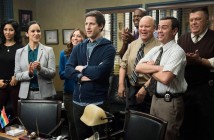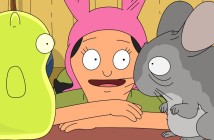19/1/2014, 9:00 p.m. (EST), HBO
On one level, True Detective is just another in a sea of police stories about the terrible things men do to women. There’s a dead girl at its center, and two cracked, broken men trying to piece together what happened to her, and maybe find some peace for themselves along the way. What sets this show apart from any of the dozens of similar shows on television is its sense of mood. From a bird’s-eye view, nothing about this show hasn’t been done before a million different places. But the details—the performances, the darkly poetic scripts, the way it turns Louisiana into a haunted husk of crumbling structures and the people who subsist amidst them—are what make the show into something special.
“Seeing Things” delves deeper into Rust’s past and psyche, using the show’s frame narrative as a way to examine the variations between the man in 1995 and what he has become by 2012. The way his hallucinations slowly creep into the story as if from the edges of the frame could feel forced if it wasn’t so artfully done, but those provide a window into his troubled past as an undercover narcotics officer, and for the plaintive present-day Rust, three sheets to the wind and chain-smoking by noon, to talk about the way he’s finally found himself, and through that, some peace.
The Rust of 1995 is a man just barely repressing his demons, and though McConaughey plays him as a misanthropic stoic, it’s clear he is just doing his best to keep a lid on all the darkness inside him, to keep it from exploding outwards where it could damage anyone other than himself. Rust has been through enough to make his trauma understandable—dead child, ex-wife, murdered suspects, years spent hooked as an undercover cop who never got to come up for air—so that the endless waves of cynicism and nihilistic philosophy he spouts tends to make sense.
Marty is a harder man to get a handle on, seeming to take his job and the (much less) traumatizing things it makes him see, as an excuse to behave pretty much however he likes. Marty is a creature of self-justification—he drinks to put the job out of his mind, he cheats on his wife for the family—whose flaws are all because he’s a victim of something, trying to turn a negative situation into a chance to be a hero. This makes Marty the less interesting of the show’s leads (though Harrelson plays him very well), because he is something we’ve seen before: a flawed man grappling in the dark for some way to rationalize his sins.
If Marty feels a bit overdone at this point, Rust is enough to hold True Detective together, and to turn it into the hypnotic hour of television “Seeing Things” becomes. Rust is a man whose better angels have lost the battle; his demons took over and are trying to keep up appearances just to keep his body shambling through any given day. And he is unleashed on a society in which the same battle has been lost. The Louisiana of True Detective has been overtaken by the same sort of darkness that captured Rust. It’s something wild, something primeval, something wrong that long ago swept into this place, and that leaves our two detectives flailing for a lifeline. They are, intrinsic to their work, white hats in a world that doesn’t know exactly what to do with those. Nature plays a big, haunting role on the show, turning what could be innocuously beautiful shots of the Louisiana countryside into an encroaching state of mind that is overtaking the psychological, as well as the physical landscape.
“Seeing Things” mostly reveals that we aren’t watching the sort of cop story this show appears to be on the surface. If it delves more into the way nature is overtaking it’s Louisiana and bringing with it something dark, it also reveals Rust and Marty as animals making a play at being human. Marty’s mask is his family, his cloak of decency that, in his mind, allows him to do pretty much anything he desires. Rust’s mask is his stoicism, the way he can present himself to the world as unfeeling to hide the tumult within. They cling to these as a boon in their efforts to navigate a world gone mad. But the cracks are already showing, and it’s early yet. When darkness falls and the wolves come out to play, these crumbling facades won’t be able to hide the creatures within.
The Roundup
- -“There was a time when men just didn’t air their bullshit to the world. Just wasn’t part of their job.”
- -“Every person within a thousand miles of here is religious in ‘some kinda way.’ ‘Cept for you.”
- -“She was just chum in the water, man.”
- -“I used to think about it more, but you reach a certain age, you know who you are…I know who I am. After all these years, there’s a victory in that.”
- -“’Round here they’re rough…or whiskey limp.”
- -“Of course I’m dangerous. I’m police. I can do terrible things to people. With impunity.”
- -“The hell good is cake if you can’t eat it?”
- -“Do somethin’ else.”
- -“Throughout history, I bet very old man said the same thing. But old men die, and the world keeps spinning.”
- -“I think of the hubris it must take to yank a soul out of nonexistence into this…meat.”
- -“Well you’re a smart ass with your mouth shut.”




